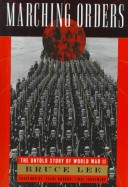This sprawling, undisciplined study argues that the U.S. breaking of Japanese diplomatic and military codes played a major role as well in the defeat of Nazi Germany. Lee (coauthor of Pearl Harbor: Final Judgment) suggests that intercepts expressing Germany's commitment to world conquest helped determine the Allied policy of unconditional surrender. He demonstrates that Japanese reports on German defenses in northeastern Europe shaped plans for D-Day. And he argues that decoded messages stressing Japan's search for common ground with the Soviet Union near the end of the war encouraged the dropping of the two atomic bombs on Japan to end the war before this approach could bear fruit. Lee, however, significantly overstates the direct connection between Magic code intercepts and Allied decision-making. Much of his information is also available in Carl Boyd's Hitler's Japanese Confidant?a significantly superior work of analysis and interpretation. Author tour. Copyright 1995 Reed Business Information, Inc. --This text refers to an out of print or unavailable edition of this title.
- ISBN13 9780850524789
- Publish Date 26 June 1995
- Publish Status Out of Stock
- Publish Country GB
- Imprint Pen & Sword Books Ltd
- Format Hardcover
- Pages 623
- Language English
